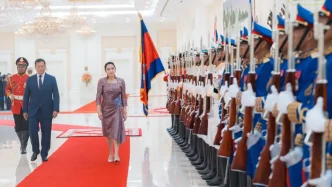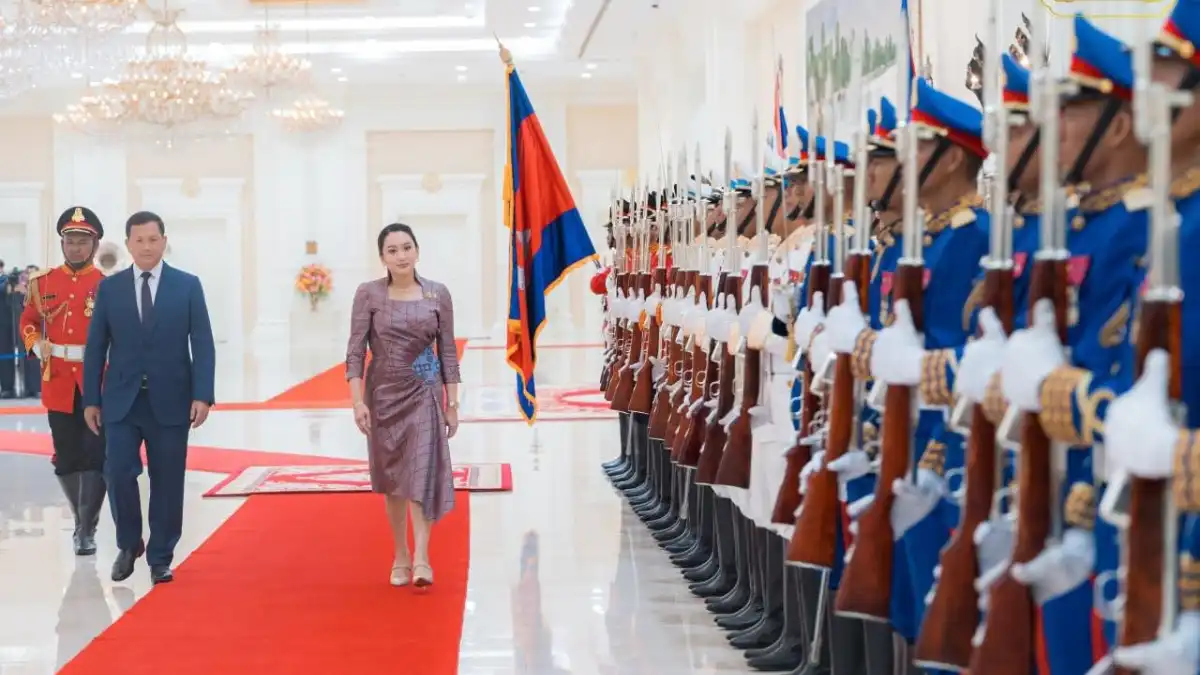Bangkok is grappling with a mounting political crisis as Prime Minister Paetongtarn Shinawatra faces protests over a leaked audio clip, while border tensions with Cambodia escalate following a fuel import ban. The convergence of domestic unrest and regional friction has raised questions about the stability of Thailand’s government and its diplomatic relations, with economic repercussions looming for businesses on both sides of the border.
Protests Erupt Over Alleged Audio Leak
In the heart of Bangkok, thousands of protesters have surrounded Government House in recent days, demanding the resignation of Prime Minister Paetongtarn Shinawatra. The unrest stems from a leaked audio recording purportedly featuring the prime minister discussing political strategies that critics claim reveal manipulative intent. While the authenticity of the recording remains unverified, demonstrators have seized on it as evidence of unethical governance.
“We cannot trust a leader who schemes behind closed doors” said a protester, speaking anonymously due to fear of repercussions. The sentiment reflects a broader disillusionment with the administration, which has struggled to maintain public confidence amid ongoing economic challenges and regional disputes.
Paetongtarn has vehemently denied any wrongdoing, asserting that the audio clip is fabricated or taken out of context. Her office issued a statement emphasizing her commitment to transparency and urging calm while investigations proceed. However, with no independent confirmation of the recording’s origins, the controversy continues to fuel public anger, drawing parallels to past political scandals that have destabilized Thai governments.
Border Closure Sparks Diplomatic and Economic Strain
Adding to the domestic turmoil, Thailand’s decision to close certain border checkpoints with Cambodia has intensified regional tensions. The closures, which the Thai government claims are necessary for security reasons, coincide with Cambodia’s recent ban on fuel imports from Thailand. While officials in Bangkok insist the measures are unrelated to political motives, speculation abounds that the moves are retaliatory.
Prime Minister Paetongtarn addressed the issue in a public statement, denying any political agenda behind the border restrictions. “Our priority is the safety and stability of our border regions” she said, emphasizing the need to curb illegal activities. Despite these assurances, the timing of the closures—shortly after Cambodia’s fuel ban—has raised eyebrows among analysts and local communities reliant on cross-border trade.
Thai businesses, particularly those in the fuel and logistics sectors, are bracing for significant losses. The Cambodia fuel import ban, which affects millions of dollars in annual trade, has already disrupted supply chains. One logistics firm owner in eastern Thailand estimated losses of up to 2 million Thai Baht (US$56,000) if the ban persists beyond the next quarter. “We’ve built our business on this trade route, and now everything is at risk” he said, requesting anonymity to avoid government scrutiny.
The economic fallout extends beyond immediate financial impacts. Analysts warn that prolonged border tensions could deter foreign investment in both nations, particularly in border-adjacent provinces where trade and tourism are economic lifelines. With Thailand and Cambodia sharing a historically fraught relationship, marked by territorial disputes and political disagreements, the current standoff risks reigniting old grievances.
Security Concerns in Southern Thailand
Meanwhile, in the southern province of Phang Nga, authorities have arrested two men in possession of a suspected homemade bomb, raising fears of escalating violence amid the broader political unrest. Local police reported that the device was discovered during a routine security check, though details about the suspects’ motives or affiliations remain scarce. Officials have not confirmed whether the incident is linked to the ongoing protests or border issues, but the timing has heightened public anxiety.
“We are on high alert to prevent any acts of violence that could exploit the current tensions” said a spokesperson for the Phang Nga provincial police. Security measures have been tightened across southern Thailand, a region with a history of insurgency and separatist movements, particularly in provinces closer to the Malaysian border. While there is no evidence at this stage to suggest a coordinated threat, the arrest has underscored the fragility of stability in a country already on edge.
Regional Implications and Economic Fallout
The overlapping crises—domestic protests, border disputes, and security incidents—paint a troubling picture for Thailand’s immediate future. On the political front, Paetongtarn’s administration faces a critical test of legitimacy. If the audio leak allegations gain traction or are substantiated, her government could face a no-confidence motion or further mass demonstrations, reminiscent of the political upheavals that have defined Thailand’s recent history.
Economically, the border closure and Cambodia’s fuel ban threaten to disrupt a delicate balance. Thailand exports significant volumes of fuel and goods to Cambodia, with bilateral trade valued at billions of dollars annually. A prolonged standoff could push up prices for essential goods in Cambodia while costing Thai firms dearly. Small-scale traders, who rely on daily cross-border transactions, are particularly vulnerable, with some reporting losses of up to 10,000 Thai Baht (US$280) per week since the restrictions began.
Regionally, the tensions risk spilling over into broader Southeast Asian dynamics. Thailand and Cambodia are both members of the Association of Southeast Asian Nations (ASEAN), which prioritizes regional stability and economic cooperation. Analysts suggest that other ASEAN nations, such as Vietnam and Laos, may step in to mediate if the situation deteriorates further. However, historical mistrust between Bangkok and Phnom Penh could complicate diplomatic efforts.
Public Sentiment and the Path Forward
Public sentiment in Thailand remains deeply divided. While some citizens express frustration with Paetongtarn’s leadership, others view the protests and border issues as distractions from more pressing domestic concerns, such as economic recovery and inequality. Social media platforms reveal a polarized discourse, with hashtags related to the prime minister’s resignation trending alongside calls for unity and dialogue.
The government’s response in the coming weeks will be pivotal. Restoring public trust, addressing economic grievances, and de-escalating tensions with Cambodia are no small tasks. Some observers suggest that opening channels for dialogue with protesters and Cambodian officials could help diffuse the situation, though entrenched positions on both sides may hinder progress.
As Thailand navigates this turbulent period, the resilience of its institutions and the patience of its people will be tested. With protests showing no sign of abating and border trade at a standstill, the question looms: can Paetongtarn’s administration weather the storm, or will these crises mark the beginning of a deeper unraveling?















